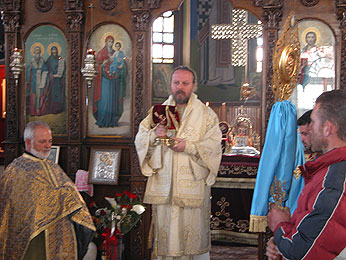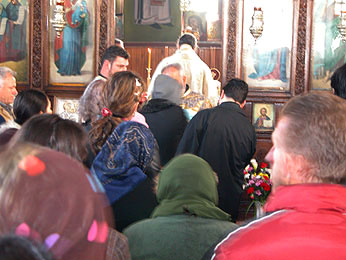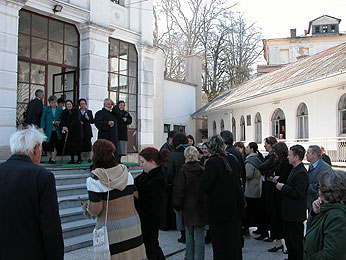Sunday of the Adoration of the Holy Cross ( 03.04.2005 )
 In the church of the Saints Methodius and Cyril in Strumica today Metropolitan Nahum of Strumica celebrated Divine Liturgy. At the Liturgy, on the occasion of the veneration of this Sunday dedicated to the Adoration of the Holy Cross and in relation with today’s Gospel that proclaims the role of the cross in man’s unity with God, the Episcope addressed the faithful in the church with an edifying homily. In the homily His Eminence interpreted what in practice means ‘to bear one’s cross’, particularly dwelling upon the well-known call of Christ in this Gospel: “Whoever desires to come after Me, let him deny himself, and take up his cross, and follow Me. For whoever desires to save his life will lose it, but whoever loses his life for My sake and the Gospel’s will save it.” (Mark 8:34-35).
In the church of the Saints Methodius and Cyril in Strumica today Metropolitan Nahum of Strumica celebrated Divine Liturgy. At the Liturgy, on the occasion of the veneration of this Sunday dedicated to the Adoration of the Holy Cross and in relation with today’s Gospel that proclaims the role of the cross in man’s unity with God, the Episcope addressed the faithful in the church with an edifying homily. In the homily His Eminence interpreted what in practice means ‘to bear one’s cross’, particularly dwelling upon the well-known call of Christ in this Gospel: “Whoever desires to come after Me, let him deny himself, and take up his cross, and follow Me. For whoever desires to save his life will lose it, but whoever loses his life for My sake and the Gospel’s will save it.” (Mark 8:34-35).
Basic precondition to interpret this Gospel are the words of Christ (spoken in another place): those who are well have no need of a physician, but those who are sick. I did not come to call the righteous, but sinners, t o repentance (Mark
o repentance (Mark
At the first degree of spiritual life ‘to bear one’s cross’ is to purify oneself from passions or more precisely to transform the passions. The mind-and-heart prayer beginning its course in the heart is a testimony the first degree has ended.
At the second degree ‘to bear one’s cross’ implies love for one’s enemies and staying in the practice of the mind-and-heart prayer, at which one exerts oneself to keep the mind all the longer collected in the heart. At the first degree the demon attacks us from within, through the passions we are captured by, whereas at the second degree the demon cannot attack us from within since our heart is no longer captured by the passions and therefore the one attacks us externally, through people.
Mainly, purification from the passions implies purification from the greatest and most significant passion – pride, that is, vainglory.
The struggle to purify the heart from the passions in the beginning seems rather difficult to us, but as we gain victories in it, the one will become ever more easy, until we reach that spiritual level to which are applicable the words of Christ: My yoke is easy and My burden is light.

